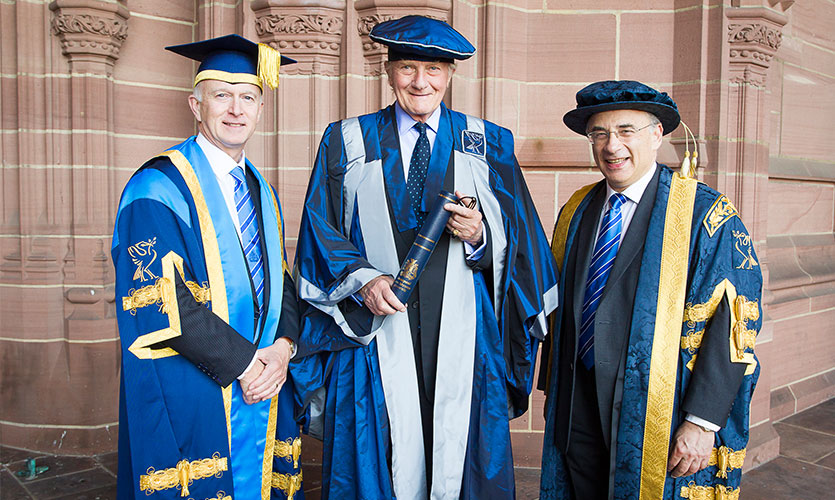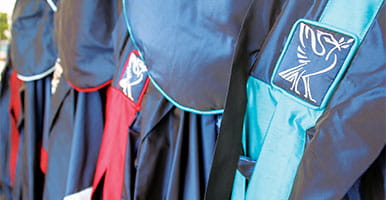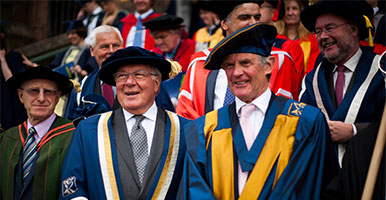Lord Michael Heseltine
Presented by Dr Edward Harcourt
Honourable Chancellor, I have pleasure in presenting the Right Honourable, the Lord Heseltine of Thenford, for the award of an Honorary Fellowship from Liverpool John Moores University.
This is a truly civic university, firmly rooted in this extraordinary city, and its defining ethos comprises three deceptively simple yet very powerful words: dream, plan, achieve.
Each July during Graduation Week, the University's highest honour – an Honorary Fellowship – is bestowed on a select band of individuals outside the University, in recognition of their outstanding achievement in a given field or profession, and who personify and inspire others to 'dream, plan, and achieve'.
We propose Lord Heseltine today for his outstanding and sustained contribution to the regeneration of Liverpool, during a long and distinguished parliamentary career in both Government and Opposition. He has been described by the Labour peer Lord Adonis as "the best social democratic institution builder of recent decades. No other minister has done more to modernise the nation's infrastructure, to envision a better future for England's cities, or to enfranchise hard-working families."
Born in Swansea in 1933, Michael Heseltine was educated at Shrewsbury School and Pembroke College, Oxford. Following National Service in the Welsh Guards, in 1957 he started a publishing venture called Haymarket, which is now one of the UK's largest privately owned media groups, with a global reach and spanning consumer and business sectors from technology to town planning, sport to medicine.
In spite of the rollercoaster financial returns that so often characterise the early stages of an entrepreneurial venture, by the age of 36 he had made his fortune and turned his considerable energies toward national political life. His 1966 election as an MP marked the start of a 35-year parliamentary career, representing first Tavistock and then Henley.
He was a Cabinet Member in both the Thatcher and Major governments, serving as Environment Secretary, Defence Secretary and President of the Board of Trade. He was unofficially tagged the Minister for Merseyside for his intensive focus on Liverpool from 1979 and, particularly, in the immediate aftermath of the 1981 riots and throughout 1982.
He famously resigned from the second Thatcher government in 1986 over an issue of constitutional principle.
He made an unsuccessful bid for the Conservative leadership in 1990 but went on to serve in the Major government, rising to become Deputy Prime Minister and First Minister of State from 1995-97. In the decade that followed the election of Tony Blair's New Labour, he returned to the Haymarket board, becoming Chairman and securing full family ownership.
Beyond his notable business and political careers, Michael Heseltine has said that he would like to be remembered for two things. One is the arboretum of some 3,500 different trees and shrubs over 70 acres at Thenford that he and his wife Anne have created and tended over the last 35 years.
An enthusiastic gardener since childhood, he wrote in one of his regular gardening columns for Country Life magazine (incidentally, not a Haymarket publication) that he always enjoyed June elections, when canvassing could be combined with chats over the fence about the contents of the front garden. He is a Vice-President of the Royal Horticultural Society and is a member of the Royal Forestry Society.
The renaissance of Liverpool must be his second legacy. He has been a vocal advocate of the importance, both for the regions and for the country, of Britain's major cities rising again and resurrecting a tradition of civic pride, prosperity, achievement and self-government. In a recent interview with the Guardian, Lord Heseltine said: "It is what made this country in the first place. London did not drive the national economy in the eighteenth and nineteenth centuries, it was driven by the great buccaneer cities of the Industrial Revolution."
Few would contest that it was Michael Heseltine who sowed the seeds of this city's remarkable renaissance and transformation over the last 30 years. He had first arrived in Merseyside in 1979, tasked with assisting regeneration. In the 1970s, more than 60% of the city's industries had been lost, along with a number of major employers, and the city had little to commend it to potential investors. The riots in the summer of 1981 were not the catalyst for his involvement with the city, but they did serve to heighten his resolve that something had to be done to stem Liverpool's decline.
As Environment Secretary, it was his foresight, influence and lobbying in national political and financial circles that created the local and central government, and private sector partnerships to invest in the regeneration of the Albert Dock, stage the 1984 International Garden Festival and commence a 25-year programme to clean up the River Mersey and its environs.
Today, the Albert Dock comprises the UK's largest collection of Grade 1-listed buildings and is the most visited multi-use attraction in the UK outside London, and the Mersey is the cleanest it has been since the early 19th century.
Distinguished age has not dimmed Lord Heseltine's vision, drive and energy. Armed with the wisdom of experience and an institutional political memory spanning five decades, he continues to influence contemporary politics and he has sustained a keen interest in the development of the Liverpool City Region up until the present day.
He has chaired the Regional Growth Fund Advisory Committee since 2010 and co-authored, with Sir Terry Leahy, a review of the Liverpool city-region's economic growth prospects in 2011. In response to the worst economic crisis of modern times, he was asked by the Prime Minister to report to the Chancellor of the Exchequer and the Secretary of State for Business on how the UK might generate growth and wealth more effectively.
Published in October 2012, his report, 'No Stone Unturned' comprises 226 pages and 89 recommendations in which he reiterates his belief in the power of harnessing localism with targeted state interventions and private sector investment. His eighteen months in Liverpool in 1981/2, Lord Heseltine recalls in this report, made him realise that "Leadership relied [too much] on London. Liverpool's challenges could only be overcome if the local community was engaged and enthused to harness its resources and build on its strengths in a much more effective partnership with central government."
He first mooted the case for directly elected city mayors in the early 1990s and Liverpool was amongst the first to take advantage of the devolved powers on offer when it elected its first Mayor in May 2012. Two months previously, Lord Heseltine had been made a Freeman of the City, in recognition of the important role he has played in the regeneration of Liverpool over the past three decades, in the process constructing a framework of regional revival that has benefitted the country's major cities more generally.
Thus, it is with great pleasure that I present the Right Honourable the Lord Heseltine of Thenford, this most distinguished adopted son of our city, for admission to our highest honour, as an Honorary Fellow of Liverpool John Moores University.




